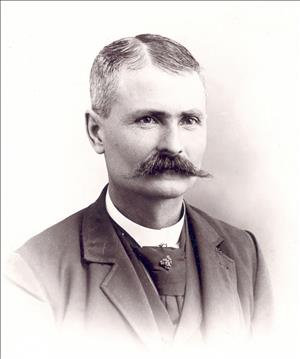William Taylor was the founder of North Bend, located in eastern King County on the Snoqualmie River where it turns north. He was a prime mover in this Snoqualmie Valley community. Taylor came to the valley at the age of 19. A hard-working man, he lived to the age of 88, long enough to see the settlement he founded grow into a vibrant community.
A Man of Many Trades
William H. Taylor was born in Iowa on February 12, 1853 to a large family. In 1872, when he was 19, he traveled across the country with his cousins, David Taylor and family, to Seattle. The Taylors chose to locate in Snoqualmie Valley. William took a job in the cookhouse at the Newcastle coal mines, near Issaquah, and spent three months peeling potatoes and washing dishes. After that, he went to Fall City to help clear land. While in Fall City, he built a canoe and paddled down the Snoqualmie River to find more work.
Near the mouth of the Skykomish River, he found a job in a logging camp for a healthy sum of $40 a month. Although he was never paid in cash, he received recompense through goods and groceries from the store in Snohomish, then called Cadyville.
Like most pioneers, he found work wherever he could. Returning to the upper Snoqualmie Valley, he spent some time working for another early settler, Lucinda Fares, and later for her uncle, Jeremiah Borst, the man known as the father of the Snoqualmie Valley. In 1873, he built a cabin, which burned down. He then built a cabin near Fall City, only to give it up upon discovering that he had to buy the land on which it was situated. He took jobs cutting trails, managing work crews, pitching hay, and again logging.
In 1876, Taylor moved to California to work in a mine. A few years later, Jerry Borst wrote to him, urging Taylor to return to run a farm which Borst had acquired. Before Taylor returned, he married Molly Beard and he and his new wife traveled north. They lived on the farm for six years and later built their own home. After buying more land they started a boarding house for folks traveling through Snoqualmie Pass. They raised six children and also ran a trading post. Later, in the 1890s, the Taylors separated and William Taylor married Ella Hyman, a widow with one daughter.
Town Builder
From 1888 to 1891, Taylor was a county commissioner and was instrumental in building many of the bridges over the rivers and streams that cut through the valley. When the Seattle, Lakeshore & Eastern Railroad arrived in 1889, he platted the townsite.
The railroad needed a town near Snoqualmie Pass. Taylor quickly platted his land and named the town Snoqualmie. Around the same time, developers had platted a town downstream and named it Snoqualmie Falls. Confusion over the similarity in names caused the railroad to name the other community Snoqualmie, and Taylor's townsite was given the name North Bend, since it was located where the Snoqualmie River turned north. As his little community began to grow, Taylor took an active interest in just about everything. He served on the school board for many years. He opened a general store. He built many homes and cleared much land. Always the conservationist, Taylor planted trees for those he felled.
Busy Until the End
In 1931, at the age of 76, he helped build a trail up Mount Si, which was dedicated as the William H. Taylor Memorial Trail by his friend the regional historian Edmond Meany. Eight years later, for the state's Golden Jubilee celebration, Taylor donned clothes from his pioneer days and participated in the pageant, sharing his many stories and adventures.
Even into his 80s, he cut wood and worked in his garden. When asked how he came to live so long he attributed it "To hard work, and to the fact that I have lived at the foot of beautiful, old Mount Si." Taylor died on January 9, 1941, and was buried at the foot of his wonderful mountain. His favorite poem, "The Builder," (author unknown) describes the changes that he brought about:
An old man going a lone highway
Came at evening cold and gray,
To a chasm deep and dark and wide.
The old man crossed in the twilight dim;
The sullen stream had no fear for him.
But he turned when safe on the other side,
And built a bridge to span the tide.
"Old man," said a fellow pilgrim near,
"You are wasting your time to build a bridge here,
Your journey will end with the close of day,
You never again will pass this way;
You have crossed the chasm so dark and wide,
Why build a bridge here at eventide?"
The builder lifted his old gray head;
"Good friend, in the way I tread,
There followest after me today
A youth whose feet must pass this way.
This chasm which has been as naught to me
To this fair-haired youth may a pitfall be;
He, too, must cross in the twilight dim;
Good Friend, I am building the bridge for him."

